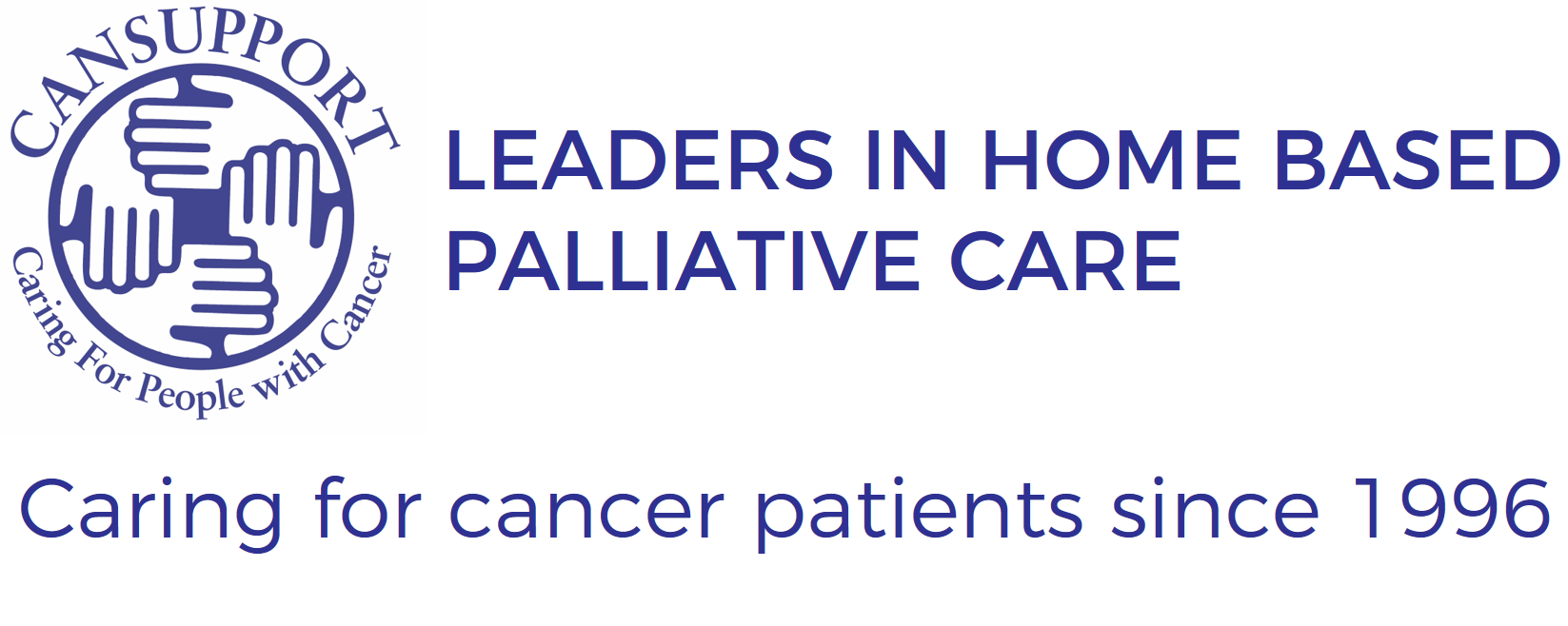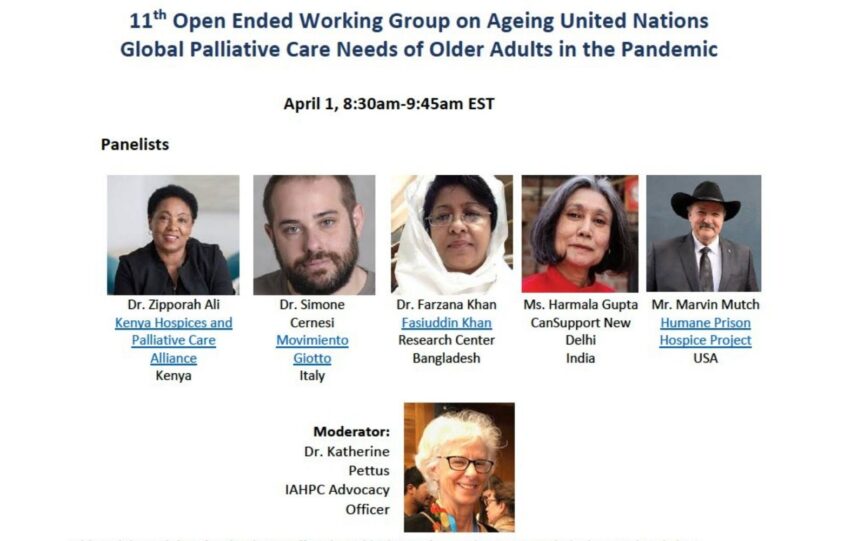The IAHPC was honored to convene a side event at the 11th UN Open-Ended Working Group on Ageing with experts Dr. Farzana Khan, Ms. Harmala Gupta, Dott Simone Cernesi, Dr Zipporah Ali, and Mr. Marvin Mutch. These panelists, joining from Dhakka, Delhi, Modena, Nairobi, and San Diego respectively, addressed a group of over one hundred participants around the world who wanted to learn more about the palliative care needs of older persons during the pandemic.
“Side events” are set up — usually by civil society organizations such as IAHPC, at these meetings to educate civil society partners and member states, which are often represented by Permanent Missions at UN organizations, about particular issues relevant to the agenda items under discussion of the UN meeting itself. For instance in this case, many member states know next to nothing about palliative care, let alone the palliative care needs of older adults during the pandemic. The side event gave them an opportunity to hear from providers in the field, working under the most challenging circumstances for the past year.
We were very fortunate to have two global cosponsors, the International Federation on Aging and the Worldwide Hospice Palliative Care Alliance, as well as several NGO sponsors. A side event is like a “pop-up” at a meeting of UN member states, so we were delighted that representatives from so many civil society organizations attended this very graphic and moving discussion of the palliative care needs of older adults in multiple settings, including prisons, nursing homes, family homes, the community, or the village.
Dr. Farzana Khan, founder of Fasiuddin Khan Research Foundation in Bangladesh, spoke about her work with the International Organization on Migration, training Rohingya refugee residents of the Cox’s Bazaar to provide basic palliative care to their neighbors. She told the story of an older woman paralyzed by a stroke who learned the exercises sent by one of the palliative care team and who now says she “has her life back.”
Still very troubling and challenging is the lack of access to pain medicine in the settlement, Dr. Khan has to prescribe “every tablet” of morphine used to control severe pain, even though the Department of Narcotics Control, Ministry of Home Affairs reports that morphine is not a “drug of abuse” in Bangladesh.
Given the “digital divide” that particularly marginalizes older persons everywhere, Dr. Ali’s description of how community palliative care teams in Kenya purchased smartphones for older persons who went home to their village to die before the lockdown – so they could continue to communicate with their families — was striking. The fact that Dr Zippy could speak about this innovation to a global audience is also striking, since it raises the awareness in the world of how what is taken for granted in one location is not necessarily the case in another. Connectivity is also an issue. KEHPCA was able to assuage the fears and paralysis of many clinicians facing the specter of COVID by organizing educational workshops in basic PPE use, primary care, and symptom control.
Harmala’s report from CanSupport in New Delhi on the distress driven obstinacy of a daughter-in-law who refused to care for her mother-in-law’s apparently repulsive cancer shows the need for training and counseling family caregivers, many of whom are thrown into a role they are completely unprepared and uncompensated for. Their roles routinely involved skilled nursing, spiritual care, and in most cases servant, subjected to hard physical labor of taking care of a body in decline. It is an extremely unappealing role for many, one they certainly don’t do for the money. Harmala’s team at CanSupport is volunteer and donor funded, going out to families to support them in any way possible including clinical. Policy is needed to support them, as well as funding and respite care.
As Harmala said, “COVID didn’t take away our ears.” Palliative care teams can still listen, can still hear what matters to people who are mostly frightened and have no idea how to cope with what seems to be an unstoppable monster, including bringing financial ruin and existential crisis to families that had otherwise been stable. All the speakers emphasized the fear that has come up for older persons and their families during the pandemic, especially the fear that if they die alone from the disease, their families will be unable to send them off with the proper religious rites.
Dott Simone Cernesi, a primary care physician and gerontologist who has been working on the front lines of a nursing home in Modena, Italy, gave a strong presentation on the terrible situation of older persons in the pandemic, their utter abandonment by the health care system, and their “living like prisoners” in their rooms, unable to leave or socialize, share a meal, or worship together. He highlighted the bioethical issues raised by the pandemic, including for staff, who have to work extra hours with very little pay under very challenging conditions. Simone’s grim warning that, without palliative care, euthanasia and physician assisted dying are around the corner, was prescient. In some US states, and indeed in some countries, euthanasia is now allowed as matter of public policy, even as palliative care is not mainstreamed and readily available to all as the IAHPC recommends.
Mr Mutch continued Dr. Cernesi’s prison theme speaking from experience of an incarcerated person’s fear of dying in prison, indeed dying alone, shackled to a bed, without any form of care or comfort. He talked about how older persons are preyed upon in prison, seen as weaker, and more vulnerable, and therefore fair game for bullying. Fortunately, there are some great NGOs working on the US enthrallment to mass incarceration and life sentences. Very few policymakers have thought through the consequences imposing life sentences, which under international law entail including palliative care for incarcerated persons whom they have sentenced to die in prison. Mr. Mutch, advocacy coordinator of the Humane Prison Hospice Project, who was wrongly sentenced to 42 years at San Quentin State Prison before being released thanks to the work of many prison reform organizations, entreated us to remember that “ending well should not be premised on living an exemplary life…we cannot allow our collective need for vengeance overwhelm our humanity and continue to throw away lives.”
The chat box was full of comments and shoutouts from around the world, a witness to our global movement. Joan Marston, founder and former president of the International Children’s Palliative Care Network, now working as a volunteer with dementia patients in Capetown, thanked the panelists for “mentioning dementia. So many with dementia cannot understand the restrictions or the reason families cannot visit them. They struggle to concentrate on Whatsapp video so don’t feel connected. And while they may not be able to understand the reasons, they can feel the loss of family contact and we are seeing increased depression on top of demential which is heartbreaking.”
The way forward There is so much to do to ensure that all people everywhere receive the palliative care they need at a price they can afford. This side event just scratched the surface of what is being done around the world for older persons, and what needs to be done. UN member states are not stepping up to the plate as quickly as we would like them to. The international system seems to be on emotional and cognitive lockdown. Few mission representatives attended the interactive sessions of the Working Group, even though they were virtual, or participated beyond reading statements from capital on the first day. We know that many government officials are very busy, they have only small missions, and have to prioritise topics in a full agenda. They say they want to give attention to the issue of older persons but can’t. That’s one reason, but as many speakers this past week at the OEWGA11 said, the main reason is ageism, the poison that has infected modern society along with the many other isms on the table right now. It is both universal and tribal. Harmala said that “at least the pandemic didn’t cover our ears,” but she meant ordinary peoples’ ears. The world’s ears are covered though – the member states ears are covered, and we will have to take the lead. That’s all there is to it.
The presence of global civil society this past week was sophisticated evidence that our ears are not covered. We are listening to each other and to older people everywhere. We can recognize and weed out ageism, now that we are more aware of its deadly manifestations, and create a world that celebrates the mutuality and interdependence of all ages. Sadly, the multilateral system that should be putting energy into protecting the rights of older persons, is missing in action, its commitments in the much vaunted human rights system unfit for purpose. Multilateralism is out of fashion in the global north, but the human rights discourse it spawned has found a new home in some of the global south countries, and in civil society.
The 11th session of the OEWGA was evidence that the multilateral system of member states as it exists today is not fit for purpose unless it admits civil society organizations as equal partners and not simply as courtiers.
Article by Dr. Katherine Irene Pettus
To read the full article click the link below:

